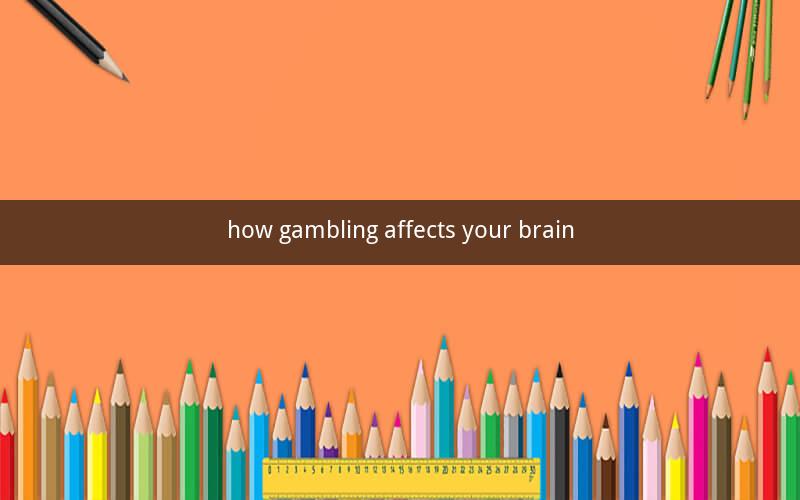
Table of Contents
1. Introduction to the Impact of Gambling on the Brain
2. The Brain's Reward System and Its Role in Gambling
3. Dopamine and Its Connection to Problem Gambling
4. The Role of the Prefrontal Cortex in Decision Making
5. The Psychological and Emotional Effects of Gambling
6. Long-Term Cognitive Implications of Problem Gambling
7. The Social and Economic Consequences of Problem Gambling
8. Strategies for Mitigating the Negative Effects of Gambling on the Brain
9. Conclusion
1. Introduction to the Impact of Gambling on the Brain
Gambling has long been a popular form of entertainment, but its impact on the brain is a subject of increasing concern. This article explores how gambling affects the brain, focusing on the psychological, emotional, and cognitive consequences of excessive gambling.
2. The Brain's Reward System and Its Role in Gambling
The brain's reward system plays a crucial role in gambling. When individuals engage in gambling activities, the brain releases dopamine, a neurotransmitter associated with pleasure and reward. This release creates a sense of euphoria and reinforces the behavior, leading to increased engagement in gambling activities.
3. Dopamine and Its Connection to Problem Gambling
Dopamine is a key player in the development of problem gambling. The release of dopamine during gambling can create a strong association between the activity and the pleasure it brings. Over time, this can lead to a dependence on gambling as a means of obtaining pleasure, potentially leading to problem gambling.
4. The Role of the Prefrontal Cortex in Decision Making
The prefrontal cortex is responsible for decision-making and impulse control. When individuals engage in excessive gambling, the prefrontal cortex can become impaired, leading to poor decision-making and a lack of impulse control. This can exacerbate the risk of problem gambling.
5. The Psychological and Emotional Effects of Gambling
Gambling can have significant psychological and emotional effects on individuals. It can lead to feelings of anxiety, depression, and isolation. Additionally, the rollercoaster of emotions experienced during gambling can contribute to mood swings and emotional instability.
6. Long-Term Cognitive Implications of Problem Gambling
Long-term problem gambling can have serious cognitive implications. It can lead to memory issues, difficulties with concentration, and impaired problem-solving skills. These cognitive deficits can have a lasting impact on an individual's ability to function in daily life.
7. The Social and Economic Consequences of Problem Gambling
Problem gambling can have significant social and economic consequences. It can lead to strained relationships, financial difficulties, and even homelessness. The impact of problem gambling extends beyond the individual, affecting families, communities, and society as a whole.
8. Strategies for Mitigating the Negative Effects of Gambling on the Brain
There are several strategies that can be employed to mitigate the negative effects of gambling on the brain. These include:
- Setting Limits: Establishing and adhering to gambling limits can help prevent excessive gambling.
- Seeking Support: Seeking support from friends, family, or professionals can provide emotional and psychological support.
- Education: Educating oneself about the risks and consequences of gambling can help individuals make informed decisions.
- Mindfulness and Stress Management: Engaging in mindfulness and stress management techniques can help individuals cope with the emotional and psychological effects of gambling.
9. Conclusion
Gambling can have a significant impact on the brain, leading to a range of psychological, emotional, and cognitive consequences. By understanding the risks and taking steps to mitigate these effects, individuals can make informed decisions about their gambling habits and protect their brain health.
Questions and Answers
1. What is the role of dopamine in gambling?
- Dopamine is a neurotransmitter associated with pleasure and reward. It is released during gambling, reinforcing the behavior and potentially leading to problem gambling.
2. How does the prefrontal cortex affect gambling?
- The prefrontal cortex is responsible for decision-making and impulse control. Impairment of the prefrontal cortex can lead to poor decision-making and a lack of impulse control, increasing the risk of problem gambling.
3. What are the psychological effects of gambling?
- Gambling can lead to feelings of anxiety, depression, and isolation, as well as mood swings and emotional instability.
4. How can setting limits help mitigate the negative effects of gambling?
- Setting limits can help prevent excessive gambling by establishing a boundary for the amount of time and money spent on gambling activities.
5. What is the long-term impact of problem gambling on cognitive function?
- Long-term problem gambling can lead to memory issues, difficulties with concentration, and impaired problem-solving skills.
6. How can mindfulness and stress management help with the emotional effects of gambling?
- Mindfulness and stress management techniques can help individuals cope with the emotional and psychological effects of gambling by promoting relaxation and emotional regulation.
7. What are some social consequences of problem gambling?
- Problem gambling can lead to strained relationships, financial difficulties, and even homelessness.
8. How can education help mitigate the negative effects of gambling?
- Educating oneself about the risks and consequences of gambling can help individuals make informed decisions and reduce the likelihood of developing problem gambling.
9. What are some economic consequences of problem gambling?
- Problem gambling can lead to financial difficulties, including debt, loss of employment, and even bankruptcy.
10. How can seeking support help with the psychological effects of gambling?
- Seeking support from friends, family, or professionals can provide emotional and psychological support, helping individuals cope with the emotional and psychological effects of gambling.